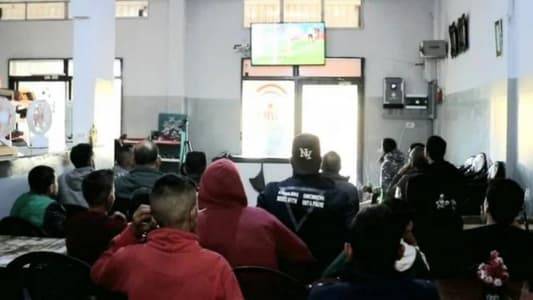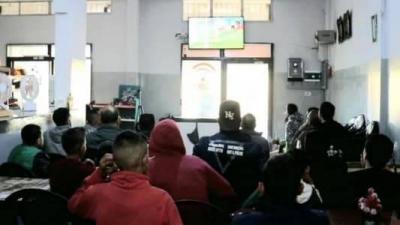This is the first "World Cup" after the economic and financial collapse in Lebanon, and football retains its fans who have not been able to follow its matches due to the crisis and the costs of subscribing to the broadcasting company of the championship. The public's enthusiasm for the World Cup has not changed, but people's circumstances have; they have to adapt to the prevailing conditions, regardless of what they may be. The majority in Akkar and Tripoli are football enthusiasts and fans of the competing teams; these days, they are turning to cafes, especially the popular ones, which have equipped themselves with screens to show the matches. Conversely, some others, despite their passion for the game and desire to watch the matches, have chosen not to follow them to avoid incurring financial burdens not accounted for in their budgets during the most challenging circumstances families in the north have faced in years.
The rooftops and balconies have missed the flags of the participating countries this season; in Akkari villages and towns, flags would typically fill the balconies, shop facades, and cars during this time. These exceptional scenes are only seen during the World Cup. Now, the flags have almost disappeared from facades, and people's interaction with the game is limited to social media, where they engage in cheering rituals and express their sports opinions for free. In the past, the World Cup would light up the world around it, with the voices of sports commentators echoing from every house, street, and corner. When the match time came, people would disappear from the roads to sit in front of screens, whether in cafes or homes. The sounds of the vuvuzelas and the shouts of youths and teenagers, along with the unified "Gooool," all moved from neighborhoods and homes to small popular cafes that broadcast the matches.
Popular cafes are experiencing a time of prosperity. In this regard, Ahmad Ali, who owns a restaurant and snack bar in the Akkar plain, which he transformed into a popular cafe just before the World Cup, said, "The World Cup has revitalized business, and due to the crisis, many could not afford to buy a receiver and subscribe to the encrypted channels broadcasting the matches, so people have turned from their homes to us." He added, "The cafe remains better than the restaurant; there is activity at the beginning of the World Cup that was not present before, and we hope it continues even after the matches, especially since the European league is also upcoming."
Ali Al-Mida, a fan of Saudi Arabia and Brazil who was watching the match between Saudi Arabia and Poland, stated, "We would prefer to watch the matches at home because it’s more comfortable, but the tough circumstances, starting from the lack of electricity to the inability to secure a subscription to encrypted channels, push us to cheap cafes where we pay around 20 or 30 thousand Lebanese pounds for each match."
Young Khaled clutches a Brazil flag in the cafe, waving it and wrapping it around his head. He said, "I am a Brazil supporter, and I love this flag. We have even been deprived of buying it since any flag, no matter how small, costs over a hundred thousand Lebanese pounds." He continued, "How I wished to drive in a popular parade in support after Brazil's first win, but gasoline is too expensive... We are living in sporting deprivation in every sense of the word, and for those of us who could watch the matches of our supported team, and not all matches, that's an achievement in itself."
Amidst this, there are those who cannot watch the matches either at home or in cafes, and they are seen searching on their mobile phones; checking free sites from here or apps from there that allow them to watch the matches they love without extra costs. Some people suffice with knowing the match results and the latest developments through WhatsApp with friends who watch the matches live. Additionally, there are young people who share a single receiver in one house or shop, pooling together funds for the diesel needed to run a generator during the game because, as some put it, "the load on the small generator is light."




